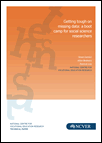Description
Research in the social sciences is routinely affected by missing data. Not addressing missing data appropriately may yield research findings that are either 'slightly off' or 'plain wrong'. This study demonstrates why and how frequently used simple remedies for missing data can impact on research results. The authors provide the target audience (i.e. producers and consumers of social science research) with a step-by-step guide on how to implement multiple imputation, which is the standard method for dealing with missing data. They encourage researchers to carefully consider the potential impact of incomplete information and to use modern missing data methods whenever possible in their own work.Summary
About the research
Research in the social sciences is routinely affected by missing or incomplete information. Ignoring missing data may yield research findings that are either 'slightly off' or 'plain wrong'. However, there is often confusion over how best to handle missing data.
In this paper, the authors repackage the highly technical missing data literature into a more accessible format. They illustrate why and how simple approaches to handling missing data fail. Here, simple approaches are those that delete records with missing data or which replace missing observations with crude estimates of their hypothesised 'true' value. They then discuss several common methods for addressing missing data and conduct a simulation study with real-life data to assess the performance of these methods. They conclude with a step-by-step guide on how to implement multiple imputation as one of two current 'gold standard' missing data methods.
The key message of this paper is that modern software packages make it relatively easy to implement methods that handle missing values properly.
Tom Karmel
Managing Director, NCVER
